Candidates for State Office Address Voters
- October 18th 2024
- Elections
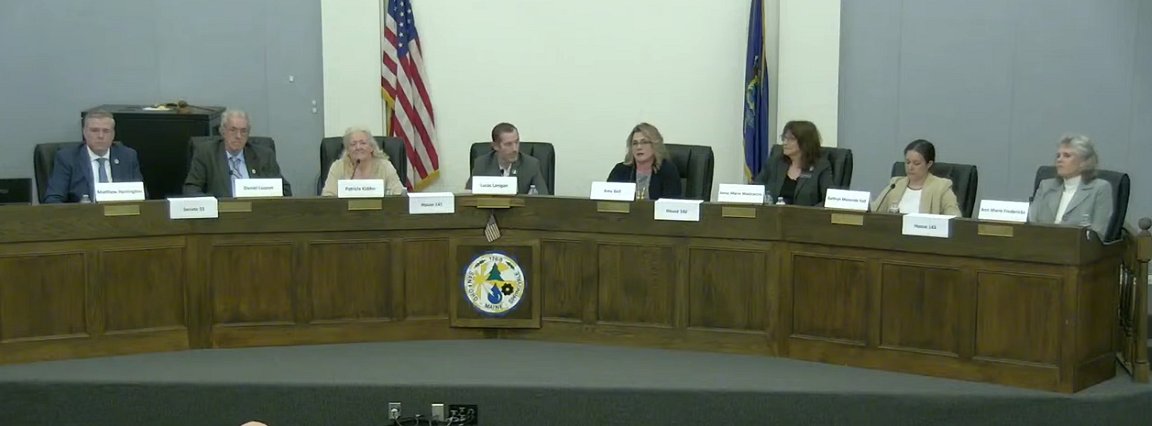
Candidates for State Senate and State Representative appeared at Candidates Night on Oct. 9.
Photos: WSSR-TV
By Zendelle Bouchard
Candidates for State Senate and Sanford/Springvale’s three State House seats gathered at City Hall on Oct. 9 to answer questions posed by moderators Shawn Sullivan and Tammy Wells.
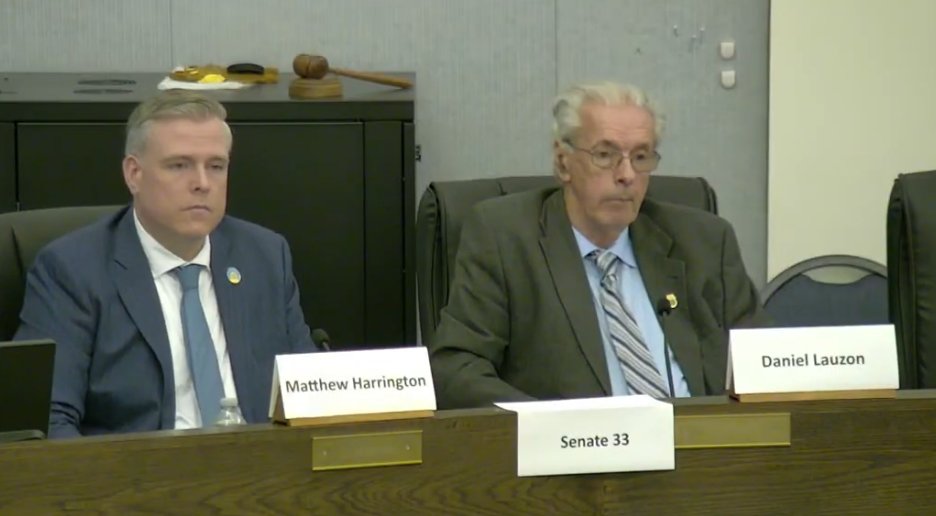
L to R: Matt Harrington and Dan Lauzon
Introductions
District 33 State Sen. Matt Harrington (R) is completing his first term. He previously served four terms as state representative. He is employed as a police officer and realtor, and lives in Sanford with his wife. His opponent, Dan Lauzon (D), is a retired locomotive engineer and served as the legislative representative for New England’s engineers and trainmen for decades.
District 141 candidate Patricia Kidder (D) grew up in Shapleigh and raised her family in Springvale. She worked for many years as a tax preparer and is now retired. She noted that the incumbent missed a third of the votes in the last session. Lucas Lanigan (R), is completing his first term in the House. He described himself as an independent voice, and said his absences were due to “missing a gallbladder.”
District 142 challenger Amy Bell (R) is the administrator of the Sanford Christian Academy who moved to Sanford in 2003. She describes herself as a wife, mother and grandmother rather than a politician. The incumbent, Anne-Marie Mastraccio (D), has represented parts of Sanford and Springvale in the Legislature for 10 years. She was previously a School Committee member, town councilor and mayor.
District 143 candidate Katie Manende Hall (D) is a wildlife biologist in charge of vegetation management programs for Central Maine Power. She has been involved in numerous boards and committees since moving to Sanford seven years ago. Incumbent Ann Fredericks (R) is a nurse practitioner with 35 years of experience working with the Veterans Administration. She is a small business owner with a medical cannabis office in South Sanford.
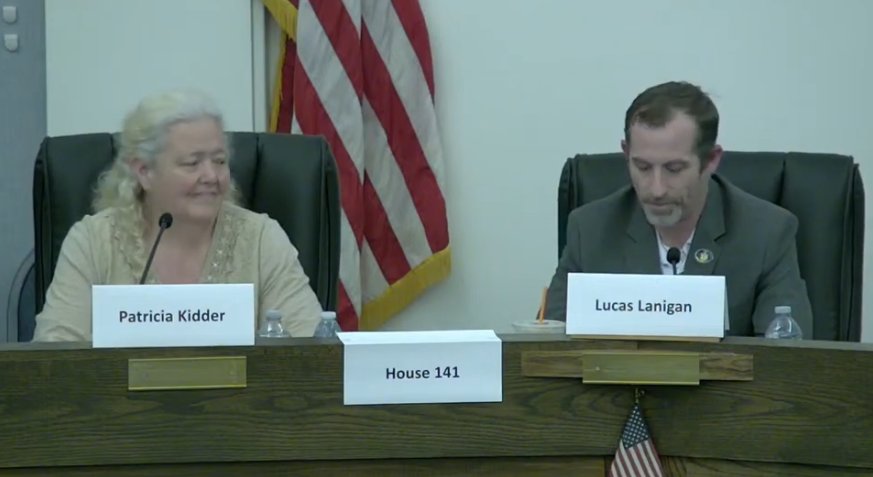
L to R: Patricia Kidder and Lucas Lanigan
Homelessness
Lauzon touted his 35 years of experience in working with railroad personnel suffering from PTSD due to people who commit suicide by jumping in front of a train. If not treated properly, this can lead to substance abuse and other mental health issues, he said. He helped to develop a substance abuse treatment program that he described as effective. Harrington said the Legislature has an obligation to provide resources for those seeking help, but that state policies intended to help, such as the needle exchange program, are making things worse. He advocated for a more aggressive approach that forces unhoused individuals to accept available services.
Kidder said the new substance abuse facility being built in Alfred is a good place to start in tackling the issue of homelessness. Lanigan advocated for a comprehensive and proactive approach that will work for all Maine communities, not just Portland. Bell said more needs to be done to help addicts and the homeless, noting a friend’s son with PTSD committed suicide after being turned away from a facility. Mastraccio defended the work done by the current Legislature in funding more homeless shelters and praised the Sanford Police Department’s Mental Health Unit. Manende Hall vowed to work across the aisle to combat the problem. Fredericks wants to minimize regulations and reduce the number of permits needed to build housing and incentivize more developers to come to Maine.
Workforce housing
Most candidates agreed the state should financially help developers create workforce housing units, which would be affordable for middle-class workers including teachers, police officers and shipyard workers. Harrington said he preferred to keep government out of the equation and instead reduce permitting requirements and codes.
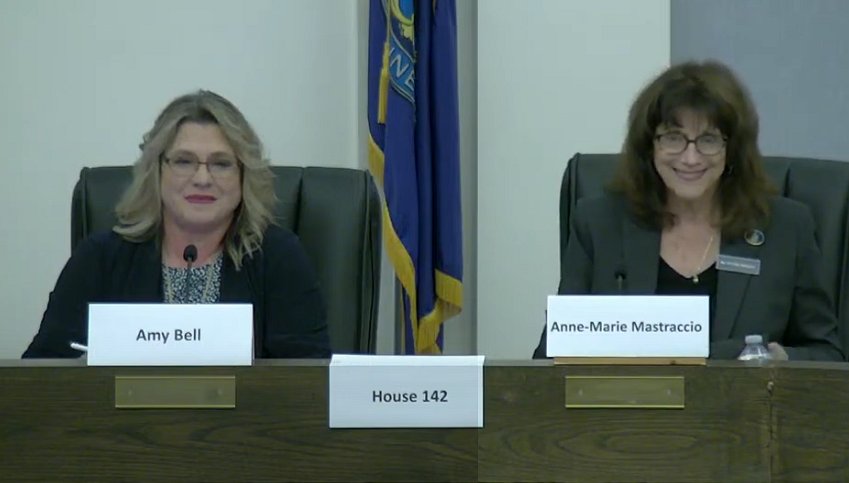
L to R: Amy Bell and Anne-Marie Mastraccio
Subsidizing Solar
Lanigan said the Legislature needs to stop making ratepayers and taxpayers subsidize solar and wind farms, which he said contributes to his $450 a month electric bill. He also objects to making beautiful areas “look like industrial plants” with solar panels and windmills; he predicted proposed offshore wind farms will have a detrimental effect on the coastline. Kidder agreed the costs are not acceptable but said that solar farms are helping to reduce the impacts of climate change. She recommended homeowners join a community solar program to save money but would also like to see a program to help residents with the high cost of electricity.
Bell agreed that something should be done about solar farms. Mastraccio said net billing was introduced to encourage investment in Maine, but said she supports studying the effects of the program to see if the impact on ratepayers needs to be addressed. Manende Hall stated the largest impact on electric bills is on the supply side rather than the delivery side. Fredericks said net billing is a problem that needs to be ironed out. Lauzon agreed. Harrington pointed out that Maine’s public advocate, who is a strong environmentalist, agrees that the program needs reform.
Changing Maine’s Flag
All candidates said there were more important issues for the Legislature to address than the flag. Bell would like to leave the flag the way it is, while Manende Hall said that, as a forester, she is a little more biased toward the pine tree design. Mastraccio and Fredericks oppose the change due to the cost of the changeover; Lauzon said the Secretary of State’s office told him flags would not be changed until they wear out and are retired, so the cost would be minimal.
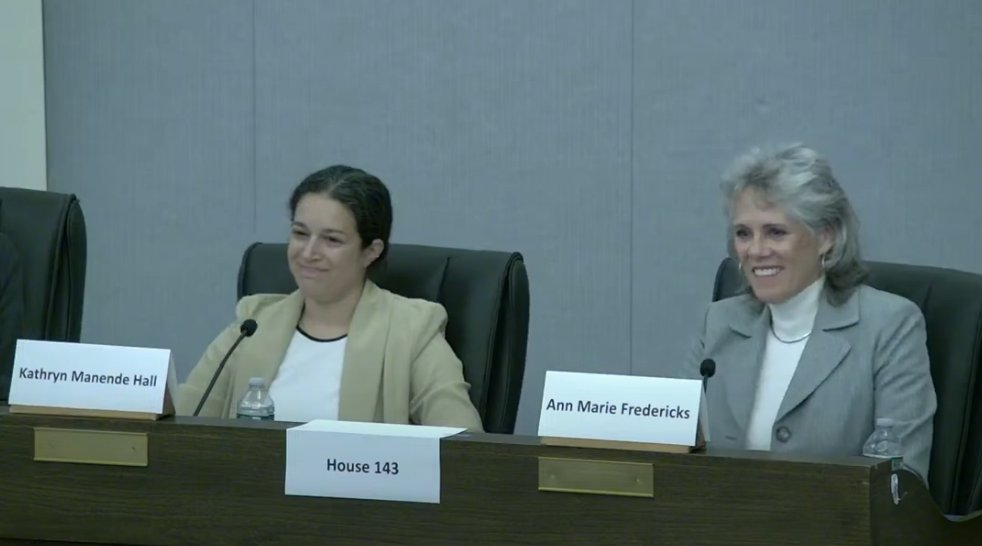
L to R: Katie Manende Hall and Ann Fredericks
Shortage of Primary Care Doctors
Mastraccio said more training is the answer and favors a bill to create a medical school at the University of Maine to train doctors right here. She noted Maine must employ many traveling nurses, which adds to the burden of health care costs. She worked on the task force looking at funding for the new community paramedicine program. Bell said her family had to wait months to find a personal care physician and noted the number of traveling nurses she encountered when her husband was hospitalized. She would be willing to work across the aisle to find solutions to the shortage.
Manende Hall favors learning from other states to see what programs have been successful. Fredericks said new doctors are going into more lucrative specialties rather than primary care, and favors offering incentives, particularly in hard-hit rural areas. Harrington said Maine’s tax rate discourages doctors from working here and said he has sponsored legislation to allow more telehealth services. Lauzon said doctors in Maine earn less than in other New England states and this needs to be addressed. Kidder said the housing shortage is another factor discouraging medical professionals from working in Maine. Lanigan said people are discouraged from advancing in their careers because of the big jump between MaineCare and the cost of private insurance.
Negative Ads
Most candidates said they have not been impacted by negative advertising and would not authorize such advertising. Fredericks described a mailer that went out during the 2022 campaign that linked her to dirty water, which was not an issue she was involved in. Mastraccio noted that negative ads are sent by outside groups but “I’m happy to talk about what I’ve done, I don’t need to talk about my opponent.”
Gun Laws
Fredericks praised Maine’s yellow flag law, which she said has been used to a much greater extent since the Lewiston tragedy and shows that our current system works. She said mental illness is still such a stigma that is not discussed openly or addressed quickly and “we put our heads in the sand” rather than recognizing that it is key to gun violence. Manende Hall said she has concerns with Maine’s new 72-hour hold law to purchase a firearm and said that anyone who is motivated to obtain a weapon will find a way to do so. She has no issues with the yellow flag law and wouldn’t make any changes to it.
Harrington said police officers across the state did not get sufficient training when the yellow flag law was introduced and thinks the 72-hour waiting period is unconstitutional. Lauzon said more needs to be done to make the public aware of safety measures like the yellow flag law that are already on the books. Kidder agreed that more education for both law enforcement and the public is needed, as well as more emphasis on mental health. Lanigan called the 72-hour waiting period detrimental to businesses in border communities, since New Hampshire doesn’t have the long waiting period. Bell stressed that in the Lewiston shooting, “it wasn’t the gun that killed people, it was the shooter,” and advocated for more education and mental illness treatment. Mastraccio pointed to the suicide rate and the fact that guns are now the leading cause of death for children in the U.S. and said responsible gun owners are happy to wait 72 hours.
Tax Relief
Harrington advocated bringing back the property tax stabilization program for seniors that was in place for one year before being repealed. He would like to see a renewed effort to bring it back in the next legislative session. He said numerous other things can be done to address the high cost of living for Mainers, particularly the net energy billing program that was discussed earlier. Lauzon said the state should make a greater effort to go after the many federal grants that are available. “If Maine doesn’t take a federal grant…Mass. will,” he said. He said revenue sharing from the state is also key to communities.
Kidder agreed that revenue sharing must be kept at the current 55% level and said the state should do more to help small communities get federal funding for necessary projects. Lanigan would like to eliminate state income tax on overtime hours and said there are many other things that could be done with the tax code. Bell said taxes in Maine “are a little bit out of control” and advocated for tax relief. Mastraccio noted the property tax stabilization program was “totally unsustainable” and said low-income seniors can take advantage of the state’s property tax deferral program to put off paying taxes until their home is sold. Manende Hall said she would do her due diligence on the issue before making any recommendations. Fredericks said the state needs to stop spending and look at critical needs vs. desires.
Why Voters Should Choose You
Bell described herself as a compassionate person who believes in the Bible and is a conservative. “I will always speak the truth because that’s who I am,” she said. She wants to bring fresh views to Augusta and work with both parties to help people. Mastraccio said voters should choose her for her years of legislative experience in getting things done for the people of Sanford. “I am socially liberal but fiscally conservative,” she said, and will work with anyone to figure out solutions to problems. She said the main difference between her and her opponent is that she believes in reproductive autonomy.
Manende Hall said she put 100 percent into everything she does and is not afraid to stand up for what she believes in and for what the people of Sanford believe in. Fredericks said she is stronger and wiser than she was when she began her first term in the Legislature and is ready to take action to represent Sanford. Harrington said if voters are unhappy with the current direction the state is taking, they should vote for him. Lauzon vowed to be a strong advocate for tax fairness so that high-profit corporations pay the same share as working people. Kidder wants to help working families by controlling taxes and making sure the state increases revenue sharing as it can. Lanigan said only Republicans can stop the unnecessary spending at the state level.
An Important Issue Not Yet Addressed
Kidder noted candidates weren’t asked about their position on women’s rights, and said she definitely supports a woman’s right to control her own body. She said abortion should be between a woman, her doctor, and her significant other, and government needs to stay out of it.
Several other candidates addressed the issue of abortion. Lanigan said he supported the bill that was on the books in Maine for many years, but didn’t agree with changing it “to the most radical abortion bill in the U.S.” He said that Democrats who opposed the bill wound up with primary opponents.
Mastraccio pointed out that former Gov. LePage backed primary challengers for Republicans who voted against his wishes. She plans to propose a state constitutional amendment guaranteeing reproductive autonomy, which would require a two-thirds vote of the Legislature before going to voters. She also would like to see a constitutional amendment to tax nonresident homes at a higher rate.
Harrington reminded voters that he took an oath two years ago to vote against any legislation that would further restrict or expand abortion in the state and said he hasn’t changed that position.
Bell said education is the issue she would most want to work to address. She said public school students who enroll in the Sanford Christian Academy often have to be put back a year because they are behind. She would like to see parents given the choice to have their tax money fund whatever school they send their children to, including private and religious schools.
Manende Hall said one important issue that was not raised that evening was childcare. She would like to see what the state Legislature can do to support working families with those costs, as well as daycare workers who are underpaid.
Fredericks said the needle exchange program, which was changed from a 1:1 swap to a 1:100 swap during Covid, needs to be repealed. “By the signature of a pen, we could do this,” she stated.
Lauzon would like to see additional initiatives to support and advance vocational education programs for specialized jobs in automotive mechanics, HVAC and other fields.
The “Elevator Pitch”
Lanigan called himself an independent individual who can work across party lines. “We need to change the people making decisions” by giving Republicans a majority. “We are not moving anywhere except backward,” he said.
Bell noted Mastraccio’s statements about guns killing children, but said “so does abortion.” She said she was more interested in addressing housing, economics, tax relief and all the things affecting the average household and wants to bring “fresh eyes and good change” to Augusta.
Mastraccio said it isn’t about “the red team or the blue team” but about putting aside differences to solve problems and work for the common good. She pledged to work closely with Sanford city officials to advocate for responsible legislation that will help the city and York County as a whole.
Manende Hall said she was never overly political and when she was approached to run, thought a mistake had been made. But after visiting the State House, she recognized that policy making, as opposed to politics, is fulfilling and meaningful work. She would like to serve as a voice for Sanford and feels she can represent the district with common sense and integrity.
Fredericks talked about what she has learned in her first term in the Legislature and said she wants to stop “lofty spending and generous handouts” and said Mainers shouldn’t have to “scavenge to survive while we give freebies to the others…Mainers first, always.”
Harrington said the state is on a completely unsustainable path on spending and must chart a different course. He said the Democratic-controlled Legislature wants “to tell you how to heat your home, and what car you can drive,” and his bill to prohibit municipalities from banning certain sources of heat was “crushed” by the state’s Climate Energy Office even though it had bipartisan support.
Lauzon described himself as “a person who shows up” and a hard worker. He said he doesn’t mind getting phone calls in the middle of the night and listening to ideas and colleagues from both sides of the aisle. He said health and education issues are very important to him. “You don’t vote for the party, you vote for the candidate,” he concluded.
Kidder said she grew up in a conservative household and is very fiscally responsible. She said she will not vote with her party all the time because she is her own person, and humbly asked voters for their support.
View the full video of the state Candidates Night on YouTube at https://www.youtube.com/watch?v=S_cFnV5eHW0.
Read our coverage of the Candidates Night for Mayoral, City Council and School Committee at sanfordspringvalenews.com.
[Editor’s note: Several candidates throughout the evening referred to a “billion dollar shortfall” projected in the next state budget. Read this article in the Bangor Daily News for an explanation and the context behind those statements: https://www.bangordailynews.com/2024/10/03/politics/state-politics/key-context-missing-looming-maine-budget-shortfall-warnings/.






